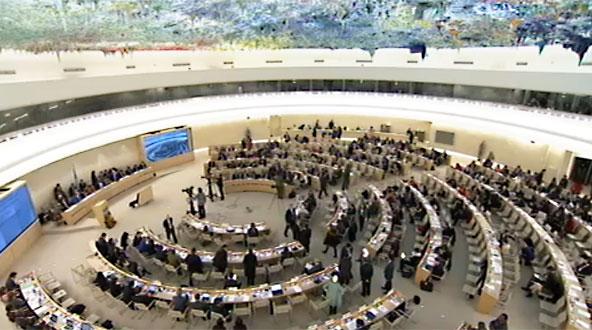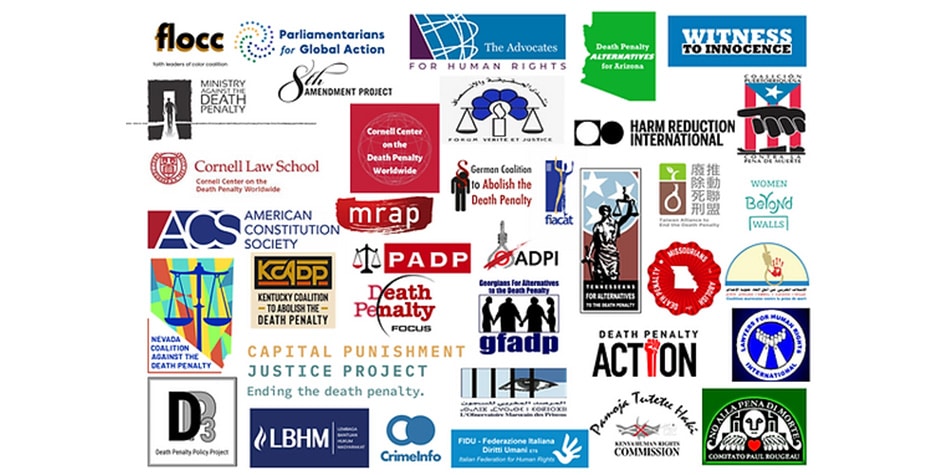
Top UN representatives take stance on death penalty at Human Rights Council
International standards
In a video message to a high-level event on the death penalty at the 25th session of the Human Rights Council, UN Secretary General Ban Ki-moon called on States that have not yet done so to ratify the Second Optional Protocol to the ICCPR aiming at the abolition of the death penalty.
“It is my sincere hope to see many instruments of ratification as we mark the Protocol’s 25th anniversary at the treaty event in New York later this year,” he told the participants in the 5 March, 2014 event in Geneva. “The taking of life is too irreversible for one human being to inflict it on another. Let us all do our utmost to put a final stop to this cruel and inhumane practice.”
In her opening statement, UN High Commissioner for Human Rights Navi Pillay summed up the reasons why we should aim for universal abolition and called “upon this Council to consider commissioning a comprehensive legal study to help facilitate the emergence of an international customary norm prohibiting the use of the death penalty under all circumstances”.
“Dead wrong”
The panellists shared their experience of steps taken in their countries to abolish the death penalty. Benin’s Justice and Human Rights Affairs Minister Valentin Djenontin-Agossou spoke about the history of death penalty abolition in Benin.
Khadidja Roussi, co-ordinator of the Network of Moroccan Parliamentarians against the Death Penalty, encouraged other MPs from the Middle East and North Africa to join forces. Kirk Bloodsworth, director of advocacy at Witness to Innocence, shared his perspective as a victim of a wrongful conviction: “They were dead wrong, and let’s face it, I am not here because the system worked. I am here because a series of miracles led to my exoneration. Not every person wrongfully convicted of a capital crime is as blessed,” he said. A member of the World Coalition’s Steering Committee, Bloodsworth added: “If a great country cannot ensure that they won’t kill an innocent citizen, they should not kill at all. People in the world, do not let this happen again, thank you.”
Asma Jahangir of the International Commission against the Death Penalty discussed the situation in Asia. She highlighted positive steps taken in Mongolia and Myanmar while regretting that the use of the death penalty is still very high in the region.
Intense debate
An intense debate followed, in which many high-level representatives expressed their views. Namibia’s foreign affairs minister recalled that her country abolished the death penalty in 1990. The Brazilian minister in charge of human rights spoke about the UN General Assembly’s moratorium resolution.
The World Coalition made a joint statement on the “unacceptable” number of death sentences imposed for drug offences with its members Harm Reduction International, Reprieve and Human Rights Watch.
“Every international donor has pulled funding from the drug enforcement programme of the UN in Iran. Similar concerns have been raised around the so-called ‘triangular initiative’, a flagship programme of the UN involving Afghanistan, Pakistan and Iran,” World Coalition Programme Director Aurélie Plaçais told the panel. “We are calling for much-needed funding to be redirected into other efforts in those countries that can do some good in relation to drugs – such as harm reduction.”
Several other World Coalition member organisations gave statements. Amnesty International and FIDH welcomed steps towards abolition in several countries including the US and Singapore and encouraged UN efforts for a moratorium on executions, but they highlighted that this was not enough – as in the case of Nigeria, where executions have resumed.
Penal Reform International denounced “cruel, inhuman or degrading” conditions on death row and called on governments to respect international standards in the treatment of people facing the death penalty.
Retentionist countries defend national sovereignty
Retentionist country representatives also took the floor. While Sudan’s justice minister insisted on the deterrence argument, the deputy minister of foreign affairs of Sierra Leone said that although abolition is desired by every nation, it depends on the national context. The president of the Human Rights Commission of Saudi Arabia spoke about the rights of victims, safety of society and the right to sovereignty.
Singapore’s representative insisted that the death penalty is a criminal justice system question, not a human rights issue. “The UN should not interfere with matters within the jurisdiction of the states” he added. “The issue of the death penalty is an issue that every state has the right to decide on.”
Death penalty high on the UN agenda in 2014
Several side events on the death penalty are taking place during the March session of the Human Rights Council:
• 3 March: side event on the death penalty organised by the permanent mission of Argentine;
• 11 March: side event on children of parents sentenced to death or executed: developments, good practices and next steps;
• 18 March: event on Iran organised by the Association for Human Rights in Kurdistan of Iran-Geneva (KMMK-G) with UN Rapporteur on Iran Dr. Ahmed Shaheed, Nobel Peace Prize laureate Shirin Ebadi, Raphaël Cheneuil-Hazan of ECPM and Mahmood Moghadam-Amiry of Iran Human Rights.
On 24 April, a panel discussion is organized by the Office of the Human Rights Commissioner in New York on the death penalty and discrimination.
In June 2014, a side event to celebrate the 25th anniversary of the UN Protocol on the abolition of the death penalty is planned at the Human Rights Council with the UN High Commissioner for Human Rights, the International Commission against the Death Penalty and the World Coalition.
In September 2014, the UN Treaty event will highlight the Protocol on the abolition the death penalty during in the first week of the UN General Assembly in New York.
In December 2014, the UN General Assembly will vote on a new resolution for a universal moratorium on executions.







